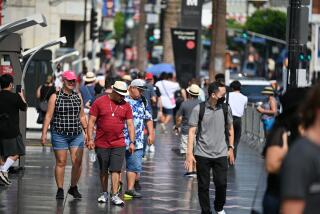U.S. tourism sector recovering from 9/11
- Share via
ORLANDO, FLA. — The number of international tourists visiting America should exceed pre-Sept. 11 levels this year for the first time since the 2001 terrorist attacks crippled the travel industry, U.S. Commerce Secretary Carlos Gutierrez said Friday.
In addition, Gutierrez said, the country collected a record $107.4 billion in travel receipts in 2006, a 5% increase from the previous year.
An estimated 51.1 million tourists from other countries visited the United States last year, just short of the 51.2 million visitors in 2000 and up 1.9 million from 2005.
Overseas tourism hit a two-year freefall in 2002 and 2003 after the attacks in 2001. The number of international tourists fell 19% from 2000 to 2003.
“We have recovered from that, and it’s just a great achievement that 2006 actually exceeded the pre-9/11 numbers” in receipts, Gutierrez said.
He was in Orlando to visit a theme park in conjunction with the tourism announcement.
But the big increases aren’t happening everywhere. Florida saw a slight drop in overseas visitors in 2006 from the previous year, from 4.4 million in 2005 to 4.3 million last year.
Long term, the Commerce Department forecast a 21% increase at the national level in foreign visitors over the next five years to 61.6 million in 2011. Particularly sharp growth is expected from Brazil, China and India.
Nine countries, according to the department, sent more tourists to the U.S. in 2006 than they ever had before: Mexico, South Korea, Australia, Spain, Ireland, India, China, Denmark and the Dominican Republic.
The majority of visitors to the U.S. -- 57% -- came from Canada and Mexico.
For every year since 1989, Gutierrez said, the U.S. has recorded a tourism surplus -- meaning that foreigners spent more here than Americans did traveling abroad. In 2006, that surplus was $7.3 billion.
More to Read
Sign up for The Wild
We’ll help you find the best places to hike, bike and run, as well as the perfect silent spots for meditation and yoga.
You may occasionally receive promotional content from the Los Angeles Times.






